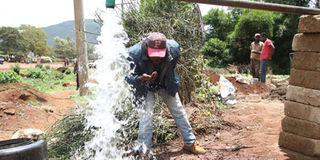If we commit to it, Africa can overcome its water challenges

A resident of Tigania East, Meru County, drinks borehole water on March 28, 2018. PHOTO | PHOEBE OKALL | NATION MEDIA GROUP
What you need to know:
- We should dedicate time and resources in protecting our water towers and finding out ways of making the cost of desalination of seawater more affordable.
- Before we engage in yet more studies, we should find out what is already established by research and implement it.
According to Water for Children Africa (WCA), a charitable organisation that seeks to solve the problems posed by lack of clean water on the continent, some 30,000 children die every year after consuming contaminated water.
The organisation argues that 85 per cent of all deaths of children under five years in Africa are related to water-borne diseases.
Studies by water experts estimate that sub-Saharan Africa loses about five per cent of its gross domestic product (GDP) every year due to polluted or contaminated water, lack of water or poor sanitation.
Though blessed with vast water resources — such as Rivers Congo, Nile and Zambezi and Lake Victoria — Africa is the second-driest continent after Australia.
DROUGHT
While such statistics may seem remote or too general, it is a fact that, today, there are many dry gorges where there once were flowing rivers only a few years back.
We no longer, for instance, have the numerous natural springs that served as our clean — indeed, uncontaminated — water sources not too long ago.
Today, we live in constant alarm of the possibility of the havoc of floods and storm water may cause once the rainy season sets in.
We constantly worry about how our livestock will survive in the wake of diminishing water resources and worry about the unpredictability of rain-fed farming.
In a nutshell, the natural rhythms that dictated our activities and created hope for our survival have been greatly disrupted over time.
MANAGEMENT
At the centre of this regrettable disruption is the question of water - its use, misuse, conservation and governance - in general.
This underscores the reason why a strategic and insightful rethink of water management in Africa is urgent.
From the trends that we have observed at personal levels and numerous studies around the water situation in Africa, it is clear that our continent is facing a huge dilemma.
It is upon the current leadership to carry the burden of inspiring the change demanded in managing our deplorable water situation if history is to judge us kindly.
That is our solemn duty to the future generations.
LIFELINE
In retrospect, I would like to appreciate afresh the mandate given to me two years ago as Unesco’s Special Envoy for Water in Africa.
A major part of that mandate involves rallying top decision-makers across African states to pay special attention to sustainable water management in the context of Sustainable Development Goal (SDG) 6, which seeks to “ensure availability and sustainable management of water and sanitation for all”.
I am particularly keen on the emphasis on “all” because water is the lifeblood of the old and the young as well as the poor and the rich in equal measure.
Another role that comes with the Special Envoy mandate involves participating in strategic, high visibility events to promote Unesco’s tools and initiatives on sustainable water management and education.
SOLUTIONS
It is in this spirit that water experts drawn from across Africa are gathered in Nairobi to share their expertise and insights as they come up with a Strategic Plan for the activities of Unesco’s Special Envoy for Water in Africa for the period 2018-2022.
The idea is to ultimately evolve a blueprint for water management in Africa.
The blueprint from this engagement should boldly pinpoint the challenges Africa faces in managing her water resources but, more importantly, propose practical solutions that will avert the doom that could befall our continent if we fail to take the necessary action for posterity.
It is not enough to regurgitate dry statistics at forums that address the water situation in Africa.
Neither is it useful to debate a situation whose consequences the continent is already suffering without thinking of practical solutions.
RESEARCH
Instead, we should dedicate time and resources in recharging our aquifers, protecting our water towers, harvesting rain and storm water and finding out ways of making the cost of desalination of seawater more affordable.
Time to develop home-grown solutions to Africa’s water woes has come.
I am sure there are numerous documents prescribing all manner of solutions to our water challenges that are gathering dust in research institutes and universities.
Before we engage in yet more studies, we should find out what is already established by research and implement it.
I have faith that Africa has men and women capable of changing the destiny of our people if they apply themselves.
Let us start with water.
Mr Kibaki is a former President of Kenya. This write-up is derived from his address to water experts from Africa gathered under the aegis of the Office of Unesco’s Special Envoy for Water in Africa.





